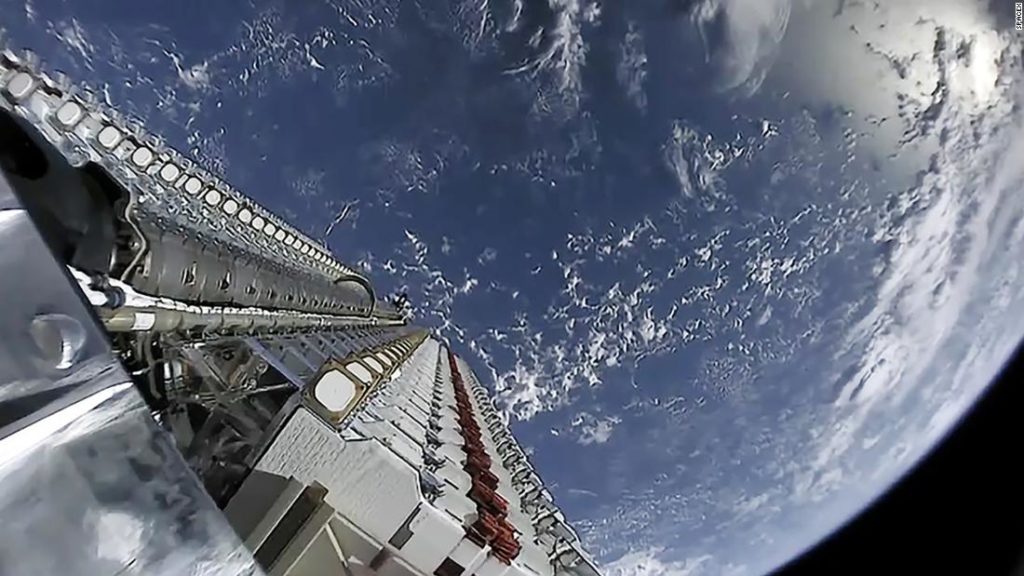Elon Musk, the CEO of SpaceX, has an estimated net worth of $209 billion. Jeff Bezos, the CEO of Amazon, has an estimated net worth of $192 billion. (By comparison, even the lower figure was higher than the annual gross domestic product of more than half the countries in the world in 2020, according to the International Monetary Fund.)
At the center of the back-and-forth is a recent attempt by SpaceX to modify its license for Starlink, a massive constellation of internet satellites, of which SpaceX has already launched more than 900. SpaceX already has permission from the US federal government to launch thousands of satellites to bulk up the Starlink constellation, and in recent filings with the Federal Communications Commission, SpaceX said it wants to put a few thousand of those satellites in a lower altitude than previously planned or authorized.
That proposed change could put Starlink satellites in the way of another constellation, called Project Kuiper, that’s been proposed by Amazon. The company has not yet launched any satellites, but it has secured an FCC license for the project.
Amazon’s current plans include putting some of its satellites into orbit roughly 590 km (or about 366 miles) above the Earth’s surface. The changes to its license that SpaceX is advocating for would allow the company to orbit nearly 3,000 of its satellites at an altitude of between 540 and 570 km (336 to 354 miles), which Amazon argues is too close for comfort. The company argued in its objection that Starlink satellites at that altitude could cause more signal interferences with Project Kuiper satellites and other nearby satellite networks.
Musk himself piled on in a tweet Tuesday, saying “It does not serve the public to hamstring Starlink today for an Amazon satellite system that is at best several years away from operation.”
Amazon fired back in a statement, saying, “The facts are simple. We designed the Kuiper System to avoid interference with Starlink, and now SpaceX wants to change the design of its system.”
“Those changes not only create a more dangerous environment for collisions in space, but they also increase radio interference for customers,” the statement reads. “Despite what SpaceX posts on Twitter, it is SpaceX’s proposed changes that would hamstring competition among satellite systems. It is clearly in SpaceX’s interest to smother competition in the cradle if they can, but it is certainly not in the public’s interest.”
SpaceX did not respond to a request for comment nor has it responded to questions from CNN in more than eight months.
Putting satellites into lower orbits is generally considered a best practice because, if a satellite were to malfunction, the Earth’s gravity could drag it out of orbit -— and away from other satellites — more quickly. Satellites that die at higher altitudes can become uncontrolled projectiles that linger in orbit for years or even decades. For example, a defunct Russian communications satellite and a satellite belonging to US-based telecom firm iridium collided about 789 km above Earth in 2009, creating an enormous debris field that is still in orbit and poses a constant risk to nearby satellites.
SpaceX did agree, according to FCC documents, that it would restrict Starlink satellites to “altitudes of 580 km or below.” But crucially, that restriction would only begin once Amazon began launching its own satellites, and it’s not at all clear if SpaceX would abide by it before Amazon begins building its own constellation. Amazon has not said when it will begin launches, but the company’s FCC license gives it through July of 2026 to build at least half of its planned constellation.
You may also like
-
UK coronavirus variant has been reported in 86 countries, WHO says
-
NASA technology can help save whale sharks says Australian marine biologist and ECOCEAN founder, Brad Norman
-
California Twentynine Palms: Explosives are missing from the nation’s largest Marine Corps base and an investigation is underway
-
Trump unhappy with his impeachment attorney’s performance, sources say
-
Lunar New Year 2021: Ushering in the Year of the Ox

